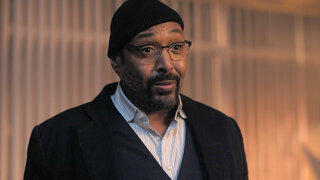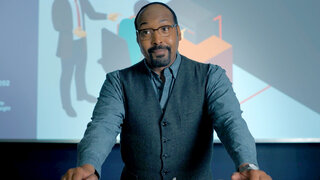How to Tell If Someone Is Lying, Just Like Jesse L. Martin in The Irrational
“There’s no such thing as a Pinocchio’s nose,” said a co-author of Big Liars. But there is a way to catch fibbers, as Jesse L. Martin does in his new show The Irrational.
How can you know when someone is lying to you? It’s a question that pops up all the time in personal and professional situations.
It’s a query the investigative behavioral psychologist played by Jesse L. Martin regularly confronts in The Irrational, premiering September 25 at 10/9c on NBC.
But don’t bank on shifty eyes or halting speech to be telltale proof that someone’s pants are on fire, according to the co-authors of the new book, Big Liars: What Psychological Science Tells Us About Lying and How You Can Avoid Being Duped.
“There’s no such thing as a Pinocchio’s nose,” said Drew A. Curtis, Ph.D., a psychologist who oversees the Clinical Science and Deception lab at Angelo State University in Texas. “A lot of deception researchers have looked into verbal and nonverbal cues, and there are some indicators. But there’s not one behavior that all humans do when they lie.”
The truth about how to tell if someone's lying
“We all lie. The good news is that most people don’t lie a lot,” said Curtis.
RELATED: Jesse L. Martin Teases the Unfinished Love Story at the Heart of The Irrational
In Big Liars, a follow-up to their earlier book, Pathological Lying, the authors note that “just a few big liars can have an outsize impact on the people around them.” That affects personal relationships, businesses, and society at large.
Lying is a hot topic people have been studying scientifically for well over a century, according to the other co-author, Christian L. Hart, Ph.D., director of the Human Deception Laboratory at Texas Women’s University near Dallas.
The burning question, he added, is how can we do it better? The fact is, we’re not very good at detecting deception. Research has shown as much. In lab studies, people are videotaped being honest and dishonest while telling a story. When students watched them and had to make a quick judgment about if they’re lying or telling the truth based on body cues, such as facial reactions and eye contact, they guessed correctly about 54% of the time, the authors said. That’s slightly above flip-a-coin chance levels.
“This is not just true for the average person, but for people whose job is to detect lying,” said Hart. “They’re no better than a college student at figuring out who's lying and who's telling the truth based on body language ... What this tells us is that people just really can’t discern when others are lying to them, based on tells like facial reactions or eye contact."
Similarly, spoken cues such as stammering, hesitating “ums,” and sounding scripted leave room for doubt.
“There are some verbal indicators that can indicate deception such as when someone speaks in a higher pitch,” said Curtis. “But an increase in pitch can indicate a variety of things like happiness or surprise, and not necessarily deception.”
People’s behavior changes when they’re interacting socially, according to the co-authors. People may be anxious or excited or they may be mirroring body language to the person they’re with.
“There are a lot of reasons why people's body language changes during interactions, but no consistent pattern with lying,” said Hart.
Strategic use of evidence: How to catch a liar
Since carrying a lie detector around isn’t practical, how can we determine people’s truthfulness?
RELATED: Psychology Tricks and Jesse L. Martin Are Front and Center of New NBC Drama The Irrational
While watching and listening to other people can’t provide surefire evidence they’re lying, red flags can get raised. These can spark a deeper dive to reveal fibs.
Any time we catch people in lies, it’s typically due to one of two things, according to Curtis: “Either evidence comes to light or they provide a confession.”
“The best way is through interrogation and what’s called strategic use of evidence,” said Hart. “When we’re questioning people, it’s really good to get them to tell stories in which they are essentially forced to reveal facts that we can then go verify.”
Were they where they said they were at a given time? Did they make a phone call? These are facts that can be checked.
“The more we can get people to talk and make statements where we can find evidence that supports or fails to support their claims, the better we can discern whether they’re lying or not,” said Hart.
To see how how Jesse L. Martin's character navigates similar issues, watch The Irrational, premiering September 25 at 10/9c on NBC and streaming the next day on Peacock.
























